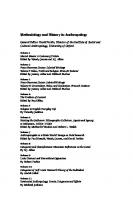The politics of Utopia : a study in theory and practice 9780091490003, 0091490006, 9780091490010, 0091490014
323 57 8MB
English Pages [292] Year 1982
Recommend Papers

- Author / Uploaded
- Barbara Goodwin
- Keith Taylor
File loading please wait...
Citation preview
The Politics of Utopia
V
The Politics of Utopia A study in theory and practice
Barbara Goodwin Lecturer in Political Theory, Brunei University
and Keith Taylor Senior Lecturer in Political Science, Coventry (Lanchester) Polytechnic
Hutchinson L ondon
M elbourne
Sydney
A uckland
Johannesburg
HX %0(o • ( r iW /
cm
f - '
Hutchinson & Co. (Publishers) Ltd An imprint of the Hutchinson Publishing Group 17-21 Conway Street, London W1P 6JD Hutchinson Group (Australia) Pty Ltd 30-32 Cremome Street, Richmond South, Victoria 3121 PO Box 151, Broadway, New South Wales 2007 Hutchinson Group (NZ) Ltd 32-34 View Road, PO Box 40-086, Glenfield, Auckland 10 Hutchinson Group (SA) (Pty) Ltd PO Box 337, Bergvlei 2012, South Africa First published 1982 ©Barbara Goodwin and Keith Taylor 1982 The paperback edition of this book is sold subject to the condition that it shall not, by way of trade or otherwise, be lent, resold, hired out or otherwise circulated without the publisher’s prior consent in any form of binding or cover other than that in which it is published and without a similar condition including this condition being imposed on the subsequent purchaser Set in IBM Press Roman by Donald Typesetting, Bristol Printed in Great Britain by The Anchor Press Ltd and bound by Wm Brendon & Son Ltd both of Tiptree, Essex British Library Cataloguing in Publication Data Goodwin, Barbara The politics of Utopia 1. Utopias-History I. Title II. Taylor, Keith 321'.07 HX806 ISBN 0 09 149000 6 cased 0 09 149001 4 paper
5 »* 2 S»tw l v * Although the plundering of utopias for new insights seems to derogate from their deliberate harmonious integrity, honour is sometimes saved, ^ for there have been attempts to realize utopian schemes in their totality, ^v * such as the setting up of a Fourierist colony at Big Sur, near San Fran( cisco (1968-9). The new popularity in France of utopianism, albeit with,. X that small section of the population which is educated, young and gauch^ iste, has also produced an extensive literature on the significance of v -. v utopianism, which is more than ephemeral. But the espousal of utopian t\ \ yv> ideas in political activity cannot easily be systematically analysed, so \ various are the associations that are made; Fourier, for example, is heral ded as a forerunner of Freud, an unpredictable honour, and a champion of permissive society. The interpretation of the text may diverge widely from the original intention of the author but, as is now argued by the pro ponents of hermeneutics and semiology, this is the proper treatment of a text, and the healthy proof of its continued vitality.29 However great the i selection or distortion, the rereading process today indicates the impor;( ‘ tant function of utopianism m political activism, as both evidence and ( "l < inspiration. ^ Despite this recent utopian revivalism, it has frequently been claimed that the present century has lost the spirit of utopianism, as Mannheim V }) wrote as early as 1929. For him, the accession to political power of the working class, formerly the vehicle for the socialist-communist utopian









